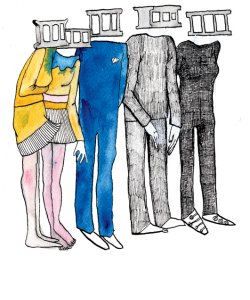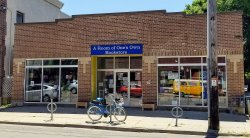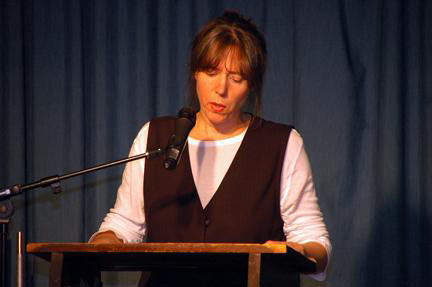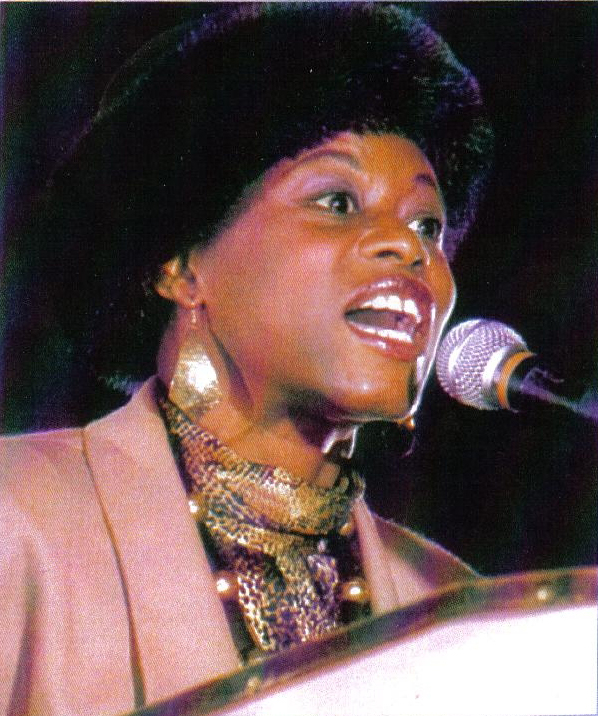The Written Image: Antigonick

In this issue we offer a look at a new, illustrated translation of the Antigone of Sophocles. Antigonick, a collaboration between poet Anne Carson and poet and artist Bianca Stone, was released by New Directions in May.
Jump to navigation Skip to content

In this issue we offer a look at a new, illustrated translation of the Antigone of Sophocles. Antigonick, a collaboration between poet Anne Carson and poet and artist Bianca Stone, was released by New Directions in May.
For the month of July, P&W–supported poet and director of literary events, Randall Horton, blogs about his work with various organizations and events throughout the northeast. Horton is the recipient of the Gwendolyn Brooks Poetry Award, the Bea Gonzalez Poetry Award, and the National Endowment of the Arts Fellowship in Literature. A Cave Canem Fellow and member of Affrilachian Poets, Horton's lastest poetry collection Pitch Dark Anarchy will be published by Northwestern University Press in Spring 2013.
In April 2 011, during National Poetry Month, Poets & Writers funded Aquarius Press/ Willow Books to sponsor a workshop in Detroit, Michigan, at the Virgil Carr Cultural Center. The workshop participants included poets Victor Billione, Nadia Ibrashi, and Felecia Studstill, and began as an organic conversation on craft. We read from a wide range of poets, from Rachel Eliza Griffiths to Stephen Jonas to Evie Shockley. We looked at parallelisms in poems (cosmic nature versus the material world), the idea of “the definition” as a form poem, and the art of the line break, which we all concluded to be critical when fine-tuning the lyric qualities in the poem, and the poem as political mouthpiece.
011, during National Poetry Month, Poets & Writers funded Aquarius Press/ Willow Books to sponsor a workshop in Detroit, Michigan, at the Virgil Carr Cultural Center. The workshop participants included poets Victor Billione, Nadia Ibrashi, and Felecia Studstill, and began as an organic conversation on craft. We read from a wide range of poets, from Rachel Eliza Griffiths to Stephen Jonas to Evie Shockley. We looked at parallelisms in poems (cosmic nature versus the material world), the idea of “the definition” as a form poem, and the art of the line break, which we all concluded to be critical when fine-tuning the lyric qualities in the poem, and the poem as political mouthpiece.
I wanted to tailor each poet’s experience to suite his or her aesthetic intentions. For example:
Victor’s exercise asked: In what ways do you feel oppressed? Choose an object you own that seems to embody that oppression and/or privilege, and write a poem about it.
Nadia’s exercise asked: What communities of people do you identify with and feel you belong to? Write a poem from the voice of this collective “we,” talking about your troubles, your failings, celebrating your strengths…
…and Felecia’s exercise asked: Imagine someone who lives in another part of the world under very different economic and political circumstance. Have that person talk to you about your life in America from his or her perspective. You can also do this exercise by imagining someone else in America, but of a different class, race, and so forth.
Then they wrote. Here are excerpts from the poems created and used with their permission:
Victor: “I sleep well knowing these references are/Framed in revolution/Evolving into stories time has forgotten.”
Nadia: “Finally, we see the words,/the shape of mornings,/the secret place.”
Felecia: “Your anger is fear/you know. You know./You are as worthy of my life/As I am of yours.”
The idea of the workshop was to take writing samples from the participants and tailor each participant’s experience based on writing tendencies, likes, dislikes, and aesthetic intentions. This helped to create a multi-voiced workshop that paid close attention to the writer and ultimately asked the writer to expand beyond his or her imagination.
Photo: Randall Horton. Photo credit: Rachel Eliza Griffiths
Support for Readings/Workshops events in Detroit is provided by an endowment established with generous contributions from Poets & Writers Board of Directors and others. Additional support comes from the Friends of Poets & Writers.
We thought we'd inject a little energy into our Wednesday with this music video by Julian Smith. Don't you ever interrupt me when I'm reading a book!
Founded in 1975, A Room of One’s Own is a feminist bookstore in downtown Madison, Wisconsin. The store specializes in women’s literature and offers a wide selection of fiction, nonfiction, periodicals, music, posters, and T-shirts for and by women. A Room of One’s Own also maintains a non-sexist children's section and stocks up-to-date titles in lesbian and gay studies, bisexual and transgender books, gender studies, as well as lesbian and gay male fiction. The store hosts several author events throughout the year.

The NewsHour's Jeffrey Brown recently spent some time with poet Natalie Diaz, author of the collection When My Brother Was an Aztec (Copper Canyon Press, 2012), who is working to preserve the rapidly disappearing Mojave language.
In a 2008 Paris Review interview with Kay Ryan, she explains her neologism “recombinant rhyme”—a craft technique of stashing “rhymes at the wrong ends of lines and in the middle.” According to Ryan, “snipping up pieces of sound and redistributing them throughout a poem” allows her to “get the poem to go a little bit luminescent.” Take a poem of yours that could use more musicality, and revise it to include recombinant rhyme.
Choose one of your poems that needs revision. Give it to five friends and ask each of them to create an audio version of it by reading it into your telephone answering machine or recording themselves reading it and sending you the audio file. Listen to the five audio versions for places where the rhythm or musical qualities of the poem fall away or sound flat. Use these readings to revise the poem.
Cara Benson, author of poetry book (made)and the forthcoming "Funny. Considering how heated it was," and receipient of a Poetry Fellowship from the New York Foundation for the Arts, blogs about teaching poetry at the Mt. McGregor Correctional Facility.
The poetry workshop I facilitate at Mt. McGregor Correctional Facility, a medium security state prison in Wilton, New York, began as a three month teaching practicum for my graduate degree. It became clear fairly quickly that three months wasn’t nearly enough to meet the interest and needs of the students inside. So we extended it to four months. Then five. Then a year. Now it’s been seven years and counting.
 In that time we have covered such varied poets as Lu Chi, Rumi, Sappho, Amiri Baraka, Federico García Lorca, T.S. Eliot, Sonia Sanchez, EE Cummings, Audre Lorde, Muriel Rukeyser, LaTasha N. Nevada Diggs, Alice Notley, Gil Scott-Heron, and CA Conrad. The list is growing like the years. Dozens of men - maybe a hundred - have come to and through the class. Some on the outside are now proud graduates of Higher Education. On the inside, a few lifers have been there since my first day. I have seen many things happen in that classroom, but fostering the dissolution of preconceived notions of what can be called “poetry” under the influence of poems like Joan Retallack’s “A I D /I/ S A P P E A R A N C E” or Douglas Kearney’s page work is particularly gratifying. I’ve seen, like realizing blondes aren’t the only beauties, the canon explode in front of our faces, and I tell you that this is a very right thing to be happening inside.
In that time we have covered such varied poets as Lu Chi, Rumi, Sappho, Amiri Baraka, Federico García Lorca, T.S. Eliot, Sonia Sanchez, EE Cummings, Audre Lorde, Muriel Rukeyser, LaTasha N. Nevada Diggs, Alice Notley, Gil Scott-Heron, and CA Conrad. The list is growing like the years. Dozens of men - maybe a hundred - have come to and through the class. Some on the outside are now proud graduates of Higher Education. On the inside, a few lifers have been there since my first day. I have seen many things happen in that classroom, but fostering the dissolution of preconceived notions of what can be called “poetry” under the influence of poems like Joan Retallack’s “A I D /I/ S A P P E A R A N C E” or Douglas Kearney’s page work is particularly gratifying. I’ve seen, like realizing blondes aren’t the only beauties, the canon explode in front of our faces, and I tell you that this is a very right thing to be happening inside.
Last month we read Harryette Mullen’s Muse & Drudge and discerned a number of tactics worth replicating. The participants loved her multiple voices, taut quatrains, and ability to twist common sayings into such rhythmic, flipped scripts. This month we are working with Rob Budde’s Declining America. There is a section in this book that plays out in scenes he’s called “My American Movie” after Jean Baudrillard’s America. So we are writing our own American scenes under the influence of his text. His poems gyrate without punctuation and stream as one undulating and pullulating sentence in prose, and the task I’ve given us of emulating his approach has proven provocative and productive.
Eric Perez, one of the participants, has this to say about the class: “Our poetry workshop has given us a unique opportunity to liberate ourselves from an oppressive system, even if only for a brief time during the week. This helps us to reach a broader understanding of life and its circumstances and to push the boundaries of our intellect in order to build our self esteem.” I am very grateful to Poets & Writers for the support it gives for the class. It can be really challenging, the proverbial upstream swim, to be a volunteer poet for the New York State Department of Corrections. Poets & Writers not only provides remuneration, but it legitimizes the endeavor. It truly has helped me to show up week after week, year after year. And as the late poet and tireless prison educator/activist Janine Pommy Vega used to say to me whenever I complained about a seeming setback or “lost” student: “Cara, you just keep going in.” So I do.
Photo: Cara Benson. Credit: David Brinson.
Support for Readings/Workshops in New York is provided, in part, by public funds from the New York State Council on the Arts, with additional support from the Friends of Poets & Writers.
Poet and educator Carole "Imani" Parker blogs about her former student "Donald" at the P&W–supported Jobs for Youth Apprenticeship Program (JFYAP) at Medgar Evers College, a job readiness program she once directed.
"Donald" was a withdrawn seventeen-year-old boy when he came to JFYAP. His reading and math scores were extremely low and he had very low self-esteem. He had been expelled from high school, two General Educational Development (GED) programs, and was eventually expelled from the GED component of JFYAP for threatening another student. With the help JFYAP coordinator, Ms. B, "Donald" was able to enroll in a computer training course and continued to attend JFYAP job readiness/life skills training, counseling, tutoring and P&W–supported poetry workshops.

Although JFYAP is now defunct, I, with Ms. B, continue to follow up with and encourage "Donald." As a matter of fact, I spoke with "Donald" the other day. He said that he completed the computer course and received a certificate. He also plans to take the GED soon and is excited about participating in P&W's annual intergenerational reading later this month. Here are the first two lines from "What am I," a poem he hopes to read at the event: I am the sound that is heard from a mile away / I am that name you hear them whisper in the wind.
"Donald’s" story is not unique. There were many troubled and talented young people who walked through the doors of JFYAP. Most of them eventually passed the high school regents or GED exam and went on to college and, later, careers. JFYAP provided them with the necessary tools to become productive citizens.
Photo: Carole Imani Parker.
Support for Readings/Workshops in New York City is provided, in part, by public funds from the New York State Council on the Arts, and the Department of Cultural Affairs, with additional support from the Louis & Anne Abrons Foundation, the Axe-Houghton Foundation, the A.K. Starr Charitable Trust, and Friends of Poets & Writers.
"Helps us to believe / That it’s no great sin to give, / Hoping to receive," writes Richard Wilbur in this poem, read by the iPhone-wielding video artist Faith Eskola's five-year-old child and brought to life by Motionpoems.